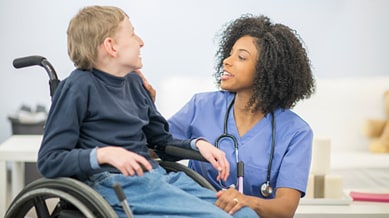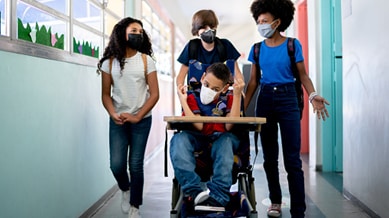Recommendations for Fully Vaccinated People
COVID-19 Homepage
Protect Your Child from COVID-19, the Flu, and Other Illnesses
Help Your Child Stay Healthy at School
What You Need to Know
- During the school year, kids tend to get sick more often — and spread germs to their friends and classmates.
- COVID-19 can cause serious health problems, so it’s more important than ever to protect your child’s health.
- You can help your child stay healthy and protect the people around them all school year long.
Ask your child’s doctor what vaccines and boosters they need
Vaccines help protect kids from getting very sick from COVID-19, the flu, and other illnesses. Ask your child’s doctor what vaccines and boosters they need to stay healthy. If it’s been a while since your child has seen the doctor, now is a good time to make an appointment for a checkup.
Who needs to get vaccinated?
- Children ages 6 months and older should get vaccinated against COVID-19 and the flu.
- Children ages 5 years and older should also get a COVID-19 booster.
It’s especially important for children who have disabilities or chronic health conditions to get vaccinated, because they are more likely to get very sick if they catch COVID-19 or the flu.
Learn More: Stay Up to Date with COVID-19 Vaccines Including Boosters
My child has a disability. How can I support them when they get their vaccine?

Sometimes, children and teens with disabilities may struggle with vaccines. When you’re making an appointment for your child to get vaccinated, you can let staff or volunteers know your child might need some accommodations.
For example, you could:
- Ask if your child can get vaccinated in your vehicle or in a quiet room away from crowds
- Ask for sensory modifications, like turning off bright lights
- Ask the vaccine provider to explain what they’re going to do and when they’re going to do it, so your child
knows what’s going to happen - Ask the provider to give your child any other vaccines they may need during the same appointment
Learn More: Getting Your COVID-19 Vaccine
Where can my child get vaccinated?
In addition to doctor’s offices, many pharmacies, clinics, and health departments offer vaccines. You can visit vaccines.gov and enter your ZIP code to find a vaccine location near you. To find a COVID-19 vaccine, you can also:
- Text your ZIP code to 438829
- Call 1-800-232-0233 (TTY: 888-720-7489)
Keep your child home if they’re not feeling well
Staying home when sick can lower the risk of spreading infectious diseases like COVID-19 and the flu to other people. Children who have symptoms of respiratory or gastrointestinal infections, like cough, fever, sore throat, vomiting, or diarrhea, should stay home.
Learn More: Isolation and Precautions for People with COVID-19
Remind your child to wash their hands
When your child heads off to school, remind them to wash their hands before and after eating, after using the restroom, and after recess.
Learn More: Handwashing
Teach your child to cover coughs and sneezes
Ask your child to cover their mouth and nose with a tissue when they cough or sneeze. Then, throw used tissues in the trash. If there aren’t any tissues nearby, encourage your child to cover their nose and mouth with their elbow.
Consider having your child wear a mask to school

Children ages 2 years and older can also wear masks to school. If your child has a disability or chronic health condition, wearing a mask can give extra protection to help them stay healthy. Masks also help to prevent children from spreading COVID-19 to other people around them. Make sure the mask covers your child’s nose and mouth.
Learn More: Masks
Take care of your child’s mental health
The past few years have been a stressful time for many families, and some children may have trouble adjusting to new routines and relationships at school. Changing routines can be especially challenging for children with cerebral palsy, intellectual disabilities, or developmental disabilities such as autism.
Talk to your child’s doctor if you have concerns about the way your child behaves at home, in school, or with friends.
Learn More: Mental Health Resources to Help Support Children
To receive email updates about COVID-19, enter your email address: